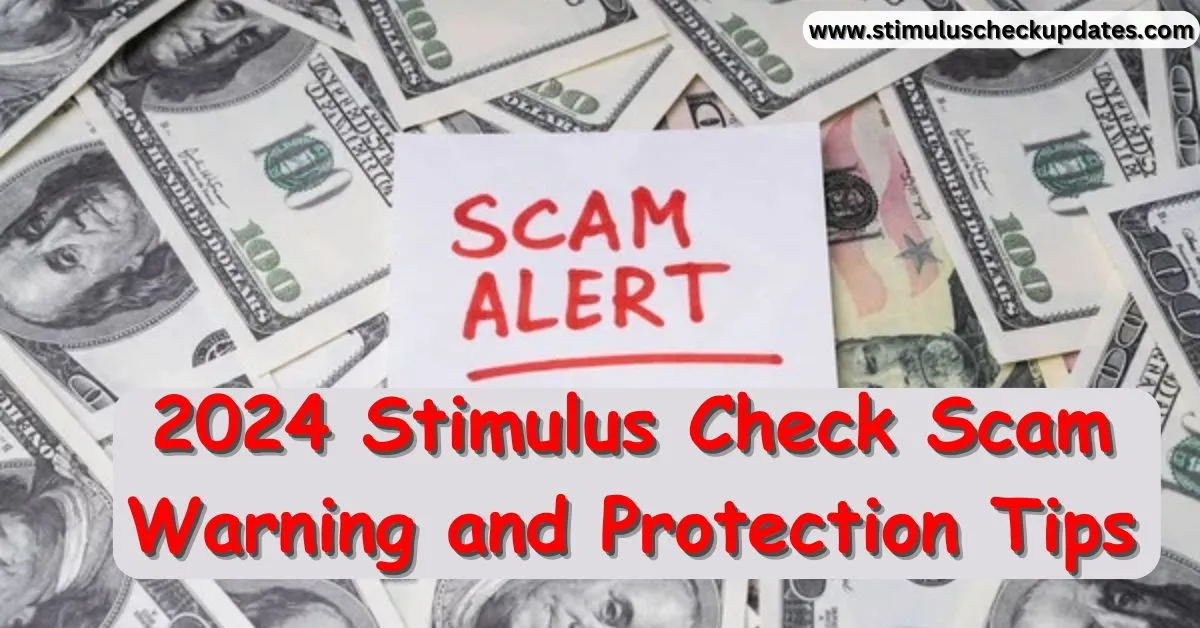2024 Stimulus Check Scam
As the possibility of a 2024 stimulus check looms on the horizon, it’s crucial to arm yourself with knowledge to protect against potential scams. The 2024 stimulus check program, while intended to provide economic relief, has unfortunately become a breeding ground for fraudsters looking to exploit vulnerable individuals. This comprehensive guide will walk you through everything you need to know about 2024 stimulus check scams and how to protect yourself.
Understanding the 2024 Stimulus Check
Before diving into scams, let’s clarify what the 2024 stimulus check actually is. The 2024 stimulus check is a potential economic relief payment that may be issued by the U.S. government to eligible citizens and residents. While details of the 2024 stimulus check are still being finalized, it’s important to understand the basics:
- The 2024 stimulus check is designed to provide financial assistance during economic hardship.
- Eligibility for the 2024 stimulus check is typically based on income, tax filing status, and citizenship.
- The amount of the 2024 stimulus check may vary depending on individual circumstances.
- Distribution of the 2024 stimulus check is handled by the Internal Revenue Service (IRS).
Understanding these key points about the 2024 stimulus check is crucial in identifying potential scams.
Common 2024 Stimulus Check Scams
Scammers are constantly evolving their tactics, but here are some common 2024 stimulus check scams to be aware of:
1. Phishing Emails and Texts
Scammers may send emails or text messages claiming to be from the IRS or another government agency regarding your 2024 stimulus check. These messages often contain links that, when clicked, can install malware or lead to fake websites designed to steal your personal information.
2. Fake Websites
Fraudulent websites may be set up to mimic official government sites, promising to help you claim your 2024 stimulus check. These sites often ask for sensitive information like your Social Security number or bank details.
3. Phone Scams
Scammers might call pretending to be IRS agents, claiming you need to provide personal information to receive your 2024 stimulus check. Remember, the IRS will never call you to request personal information for your 2024 stimulus check.
4. Social Media Scams
Be wary of posts or messages on social media platforms offering to help you get your 2024 stimulus check faster or for a fee. Legitimate 2024 stimulus check information will come directly from official government sources.
5. Fake Checks
Some scammers may send fake 2024 stimulus checks in the mail, often for more than the expected amount, and ask you to return the excess. These checks will bounce, leaving you responsible for the funds.
Red Flags to Watch Out For
When it comes to 2024 stimulus check scams, being able to identify red flags is crucial. Here are some warning signs to be aware of:
- Unsolicited contact: The IRS will not initiate contact about your 2024 stimulus check via email, text, or social media.
- Requests for personal information: Be wary of any requests for sensitive data like your Social Security number or bank account details related to your 2024 stimulus check.
- Pressure to act quickly: Scammers often create a false sense of urgency. Legitimate 2024 stimulus check information won’t require immediate action.
- Unusual payment methods: Be suspicious of requests for payment via gift cards, wire transfers, or cryptocurrency to receive your 2024 stimulus check.
- Promises of early or larger payments: No one can guarantee you’ll receive your 2024 stimulus check faster or in a larger amount than officially stated.
- Fees for services: There’s no fee to receive your 2024 stimulus check. Anyone asking for payment to help you get your check is likely a scammer.
- Suspicious links or attachments: Be cautious about clicking on links or opening attachments in unsolicited emails about your 2024 stimulus check.
Remember, staying vigilant and recognizing these red flags can help protect you from 2024 stimulus check scams.
How to Protect Yourself from 2024 Stimulus Check Scams
Protecting yourself from 2024 stimulus check scams is crucial. Here are some essential tips to keep your personal information and finances safe:
1. Verify Information Sources
- Only trust official government websites for 2024 stimulus check information. Look for .gov domain names.
- Check the IRS website or USA.gov for legitimate updates about the 2024 stimulus check.
2. Guard Your Personal Information
- Never give out personal details like your Social Security number or bank account information in response to unsolicited calls, emails, or texts about your 2024 stimulus check.
- Remember, the IRS already has your information on file and won’t contact you to request it for your 2024 stimulus check.
3. Be Skeptical of Unsolicited Contact
- The government won’t call, email, or text you about your 2024 stimulus check.
- If you receive unsolicited contact claiming to be about your 2024 stimulus check, it’s likely a scam.
4. Use Strong Online Security Measures
- Keep your computer and mobile devices updated with the latest security software.
- Use strong, unique passwords for all your online accounts, especially those related to finances.
- Consider using a reputable password manager to keep track of your passwords securely.
5. Be Cautious with Links and Attachments
- Don’t click on links or download attachments from unsolicited emails claiming to be about your 2024 stimulus check.
- If you need to access an online account, type the web address directly into your browser rather than clicking a link.
6. Stay Informed
- Keep up to date with the latest news about the 2024 stimulus check from reputable sources.
- Be aware of current scam tactics related to the 2024 stimulus check.
7. Use Official Channels
- If you need to check the status of your 2024 stimulus check, use the official IRS “Get My Payment” tool on the IRS website.
- Don’t trust third-party websites or apps claiming to provide 2024 stimulus check information.
8. Educate Your Family and Friends
- Share information about 2024 stimulus check scams with your loved ones, especially those who might be more vulnerable to such scams.
- Encourage them to be vigilant and to verify any information they receive about the 2024 stimulus check.
By following these protection tips, you can significantly reduce your risk of falling victim to 2024 stimulus check scams.
What to Do If You’ve Been Scammed
If you suspect you’ve fallen victim to a 2024 stimulus check scam, take the following steps immediately:
- Report the scam: File a complaint with the Federal Trade Commission (FTC) and report it to your state Attorney General’s office.
- Contact your bank: If you’ve shared financial information or made a payment, contact your bank or credit card company immediately.
- Monitor your credit: Check your credit reports for any suspicious activity. You can get free credit reports at AnnualCreditReport.com.
- Change your passwords: If you’ve given out any passwords, change them immediately on all your accounts.
- Document everything: Keep records of all communications with the scammer and any actions you’ve taken afterward.
- Seek support: Falling victim to a scam can be emotionally distressing. Don’t hesitate to seek support from friends, family, or professional counseling services.
Remember, if you’ve been scammed, you’re not alone. Many people fall victim to 2024 stimulus check scams, and it’s important to take action quickly to mitigate the damage.
Government Resources and Legitimate Information Sources
To stay informed about the 2024 stimulus check and protect yourself from scams, rely on these official government resources:
- Internal Revenue Service (IRS): The official source for all 2024 stimulus check information.
- Federal Trade Commission (FTC): Provides consumer information and accepts scam reports.
- USA.gov: Offers general government information and updates on relief programs.
- Consumer Financial Protection Bureau (CFPB): Provides financial education and protection information.
- Social Security Administration (SSA): Important for Social Security recipients expecting a 2024 stimulus check.
These official sources will provide the most accurate and up-to-date information about the 2024 stimulus check and how to protect yourself from related scams.
Frequently Asked Questions about 2024 Stimulus Check Scams
Q1: How will I know if I’m eligible for the 2024 stimulus check?
A: Eligibility for the 2024 stimulus check will be determined by the government based on factors like income, tax filing status, and citizenship. Check the official IRS website for the most up-to-date eligibility information.
Q2: Will I need to apply for the 2024 stimulus check?
A: In most cases, you won’t need to apply. The IRS will use information from your most recent tax return to determine eligibility and send your 2024 stimulus check automatically.
Q3: Can someone charge me a fee to get my 2024 stimulus check faster?
A: No. Anyone charging a fee to expedite your 2024 stimulus check is running a scam. The IRS will distribute checks based on their schedule, and no one can speed up this process.
Q4: What if I receive a check for more than I expected?
A: Be cautious. This could be a fake check scam. Verify the check’s authenticity with the IRS before depositing it or returning any “excess” funds.
Q5: Should I respond to emails or text messages about my 2024 stimulus check?
A: No. The IRS will not send emails or text messages about your 2024 stimulus check. These are likely phishing attempts to steal your personal information.
Q6: What if someone calls claiming to be from the IRS about my 2024 stimulus check?
A: The IRS typically communicates through mail and will not call you about your 2024 stimulus check. If you receive such a call, it’s likely a scam.
Q7: How can I check the status of my 2024 stimulus check safely?
A: Use the official “Get My Payment” tool on the IRS website to check your 2024 stimulus check status. Be wary of third-party websites or apps claiming to offer this service.
Q8: What should I do if I gave my information to a scammer?
A: If you’ve shared personal information with a suspected scammer, report it to the FTC, contact your bank, and monitor your credit reports closely for any suspicious activity.
Q9: Are there any legitimate agencies that will contact me about my 2024 stimulus check?
A: Generally, no. The IRS and other government agencies will not initiate contact with you about your 2024 stimulus check. They will send official notices by mail if necessary.
Q10: How can I stay updated on 2024 stimulus check information without falling for scams?
A: Regularly check official government websites like IRS.gov for updates. Avoid relying on social media, unsolicited emails, or phone calls for 2024 stimulus check information.
Conclusion
As we navigate the complexities of economic relief programs, staying informed and vigilant about 2024 stimulus check scams is crucial. Remember these key points:
- The 2024 stimulus check is a potential form of economic relief, but details are still being finalized.
- Scammers are actively trying to exploit the 2024 stimulus check situation for personal gain.
- Always verify information through official government sources.
- Protect your personal and financial information diligently.
- Be skeptical of unsolicited communications about your 2024 stimulus check.
- If you suspect a scam, report it immediately to the proper authorities.
By staying informed and following the protection tips outlined in this guide, you can significantly reduce your risk of falling victim to 2024 stimulus check scams. Remember, when it comes to your financial security, it’s always better to err on the side of caution.

